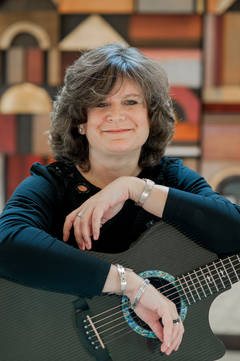Summer Camp and All That Jazz
07/11/2018 09:28:26 AM
 When I first entered college, it was to study jazz guitar. (There are not many women jazz guitarists out there, and my university was willing to put some chips down that I might be a decent one). I loved jazz-it was an amazing combination of the composer’s creation and a performer’s artistic expression. The melody, written by the composer would set up the piece. The performer establishes the song by laying down the melody, once, maybe even two or three times. But then, using the same musical underpinning (harmony), the performer is encouraged to offer his/her own melody. An improvised solo using the construct of the composer’s original creation. What a fascinating blend of creation and execution-different every time depending on who the artist is, what his/her skills are and what mood they might be in!
When I first entered college, it was to study jazz guitar. (There are not many women jazz guitarists out there, and my university was willing to put some chips down that I might be a decent one). I loved jazz-it was an amazing combination of the composer’s creation and a performer’s artistic expression. The melody, written by the composer would set up the piece. The performer establishes the song by laying down the melody, once, maybe even two or three times. But then, using the same musical underpinning (harmony), the performer is encouraged to offer his/her own melody. An improvised solo using the construct of the composer’s original creation. What a fascinating blend of creation and execution-different every time depending on who the artist is, what his/her skills are and what mood they might be in!
Jewish prayer, in general, also presents itself in these two ways. The first are the words we see/recite/chant from the prayerbook, known as keva, or fixed prayers. They follow a particular order, are formulaic in their construction and can be intoned along with the rest of the congregation following the same text, just like a jazz ensemble all reading the same musical chart. The second are the words you don’t find in the book. These are the prayers whose genesis come from the longing of the heart, whose intentions are personal, emotional and not always offered out loud, also known as kavanah/kavannot. It is the combination of these two types of prayers that round out the Jewish prayer experience.
Jewish education works similarly as well. During the school year, our kids are in a more formal classroom setting, where lesson plans are overtly articulated, goals are set and metrics designed to measure the success of the lessons applied. During the summer, however, many kids have been afforded the opportunity for some sort of camping experience where learning of a different but equal (maybe even greater) value takes place. Our kids at camp learn about who they are and who they can become. They learn about teamwork and relationships, about self-expression and values. Summer camp is the jazz improvisation that counters and compliments classroom learning.
Human beings need both-we need experiences that have strong boundaries so we can learn how to shape concepts, and others that have softer edges so we can stretch our thought muscles to grow beyond our comfort zones. Judaism encourages both regularly. So, as we are enjoying the looseness of summer, I hope that you are finding ways to stretch. The rest of the year may not offer the same opportunities, so I encourage you to use the summer to dig, explore, go out on a limb, and grow!
(By the way, I changed my major after a semester to Classical Theory and Composition, but I am still good for a jazz solo or two when the mood is right)!
Shabbat shalom,
Beth


